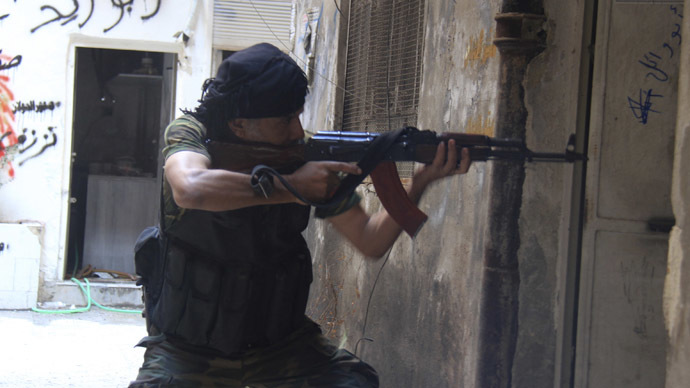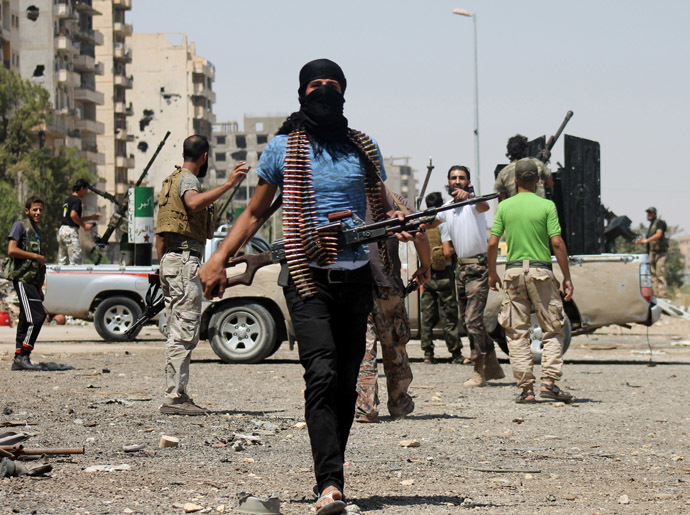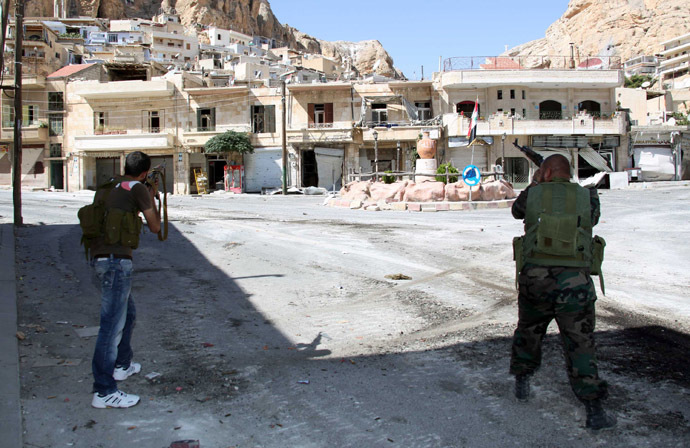‘Syria infiltrated by groups with CIA links’

No one knows for sure how the US aggression against Syria may play out, not even Washington, while Syria has been infiltrated by groups that have links to the CIA and are also backed by “certain Arab nations,” former Hezbollah MP Hassan Hoballah told RT.
RT:What are your
relations with Hamas like? There has been talk in the media
recently about some kind of a dispute between your group,
Hezbollah, and Hamas.
Hassan Hoballah: There are lots of rumors passed around. There has been speculation in the Lebanese press, and in other Arab and international media, about some sort of tension between Hezbollah and Hamas. We have already refuted such claims in public. There are no tensions between Hamas and ourselves. We do, indeed, disagree on specific issues. But we also agree on a lot of issues, the single most important of them being resistance against the Israeli occupation. We agree in principle on joint action against the Israeli occupation in Lebanon, as well as in Palestine. Part of Lebanese territory is still occupied by Israel, the same as most of Palestine.
RT:What exactly is your disagreement with Hamas about?
HH: It concerns Syria. In a nutshell, Hamas has withdrawn from Syria and established relations with the so-called “Arab Spring countries,” including Qatar, Egypt, Tunisia and others. We have never opposed any of those Arab Spring governments, but we believe Hamas has made a mistake by quitting on Syria, because Syria is the main stronghold for resistance. It has proven that with real action rather than mere promises and political statements for the press.
RT:What do you think of the recent controversy related to the alleged use of chemical weapons in Syria?
HH: We never engage in abstract speculation, whatever the subject. There is an international expert team that has been to Syria for an investigation. They have taken samples for further studies, and they have produced a report on the incident. But if chemical weapons indeed were used in Syria, it is important to find out specifically who used it. All the more so as there have been reports confirming that certain opposition groups had been supplied with chemical weapons. It is possible that they could have set up the Syrian government in order to provoke a foreign military intervention and thus turn the military tide in their favor.
RT:Could you please give us more details? What groups are you talking about, exactly? And who is presumed to have supplied them with chemical weapons?
HH: Syria has been infiltrated by groups that have links to the CIA, and are also backed by certain Arab nations. Their task is to topple the regime, since it has proved to be resilient. The West has tried to distance itself from these groups to avoid being responsible for their terrorist activities. Right now those groups are fighting one another in northern Syria. They are trying to destroy the Free Syrian Army, as we can see from yesterday’s fighting in the Azaz area. Those groups are blacklisted by the West as terrorist groups, but the West prefers to keep silent about it. The Americans back those groups, because they share the purpose of overthrowing the regime in Syria, since the Syrian regime has been supportive of the resistance against the Israeli occupation.

‘The opposition has chemical weapons too’
RT:Could you clarify exactly what evidence you have and whether you would like to hand it over to the international community?
HH: I have already said we need an investigation to find out who actually did it. I’ve also said we have leaks and media reports suggesting that some of the opposition groups have gotten their hands on certain chemical weapons. Maybe those were exactly the weapons used in Ghouta. They say chemical weapons have been used in Syria several times, or something very similar to chemical weapons.
A very telling case was a supposed chemical attack at Khan al-Assal. It took the international community two months to take notice of it. All signs show that it must have been one of the opposition groups who used chemical weapons. But there has been no investigation undertaken in order to find out which particular group did it and where it had gotten such ordnance. Our main conclusion is that the regime in Syria is not the only one in possession of chemical weapons: the opposition has them, too. So the question is: who actually did it at Ghouta and in other cases?
I definitely cannot speculate whether it was the government or the opposition. It would take a careful investigation to establish what actually happened there. But in any case, the West is using this incident as a pretext. They talk a lot about human rights, and about the legitimacy of a humanitarian intervention sanctioned by the UN. But if they truly care for the civilian population in Syria, they should have responded to the numerous massacres committed in various parts of the country by opposition groups, who attacked villages and slaughtered women and children, using weapons banned by international conventions.
RT:We hear allegations that the Syrian regime was smuggling chemical weapons to Hezbollah…
HH: That is absolutely false. No chemical weapons were ever taken out of Syria – not to Lebanon, not to any other country. The Syrian government says those are strategic weapons, stored in Syria under government supervision. I think the reports you are referring to are false. The Israelis constantly keep an eye on Syria’s chemical arsenals and on any movement across the border, and they know perfectly well that chemical weapons were never moved outside of Syria. So I think those reports have been falsified in order to validate military intervention against Syria.
‘Syria is a key element in an axis of resistance’
RT: You said earlier that in case of an American strike against Syria, Hezbollah would retaliate. Do you still adhere to this stand?
HH: In making political decisions, Hezbollah always relies on a plurality of facts collected in the field. Neither I nor any other member of the party leadership is entitled to decide single-handedly whether Hezbollah shall get involved in this or that conflict. What I can tell you, however, is that Syria is a key element in an axis of resistance. This is why no one knows for sure how an American aggression against Syria might play out eventually, not even the Americans, who have been pushing for intervention. I think that is the main reason why the United States has been hesitating – I would say they are themselves wary of the military option.
RT:Do you think intervention is unlikely, then?
HH: Yes, definitely. The Americans are lucky to have been given an opportunity not to invade, because it’s in their best interest. The US has two principal issues of interest in the Middle East: the security of Israel, and oil. And a military intervention against Syria would jeopardize both. After all, it would target a country that lies in the very heart of the Arab world, a country that is officially at war with Israel, who is holding Syrian territory, the Golan Heights.
‘War in Syria in Israel’s interests’
RT:I met one Iranian politician in Damascus and asked him, ‘How would Tehran react in case of an American strike?’ He answered that this is would be the end of Israel. I hear that in your answer as well. Could you please explain exactly what the connection is between an American strike and the end of Israel?
HH: The situation is very complicated. The war in Syria is in Israel’s interests, mainly. The current events in Syria are not the result of the problems between the people and the authorities. If Syria was in a different geographic location and there was some tension between the government and the people, we would see protests calling for a new government, changes, reforms, etc. But in Syria the opposition decided to take another path. NATO countries supplied them with weapons.
The opposition conducted military operations against strategic sites in Syria, for example, a research center or military plants. The goal of the revolution cannot be the destruction of military facilities, the nation’s security arrangements or its industry. Its goal must be to topple the ruling power, which means that what’s happening in Syria right now is a war waged by foreign forces, i.e. the US and Israel and, unfortunately, some Arab states. The goal of this war is regime change in Syria, the destruction of the Syrian state [along the lines of] the Iraq scenario, with some deviations, of course. Iraq was invaded by US ground forces, while here we are seeing intervention that is indirect. That’s why any aggression against Syria could threaten the interests of many countries in this region. I believe that Syria had to produce chemical weapons to have parity with Israel, which has nuclear weapons, and also because Arabs are not allowed to have nuclear weapons. This ban has been slapped [on Syria] by the US and Israel.

The goal of the ban is Israel’s domination in the Arab world and the Middle East. So it’s completely natural that if an Arab state were facing such a strong attack, it would have to strike Israel. Then an American-Syrian war would start, which would spill over and transform into an Israeli-Syrian one. If it doesn’t happen, there’s no guarantee that some other foreign forces don’t step into the fray. Israel is hostile to all neighboring countries and all resistance movements. The interests of other big countries are at stake, too: Iran, Russia and China. Although Russia and China are far away, they sided with Syria and warned against the US military strike.
RT:What is your understanding of whom exactly is fighting against Assad today?
HH: These groups are not in hiding, they are not underground cells. The groups which oppose the Syrian regime are legal. They are straightforward about their hostile attitude towards the regime and proclaim their goals openly. For example, when they kill young people, and tear out their hearts and livers, they say they’ve killed these people because they belonged to a specific confession.
They say that they attacked Maaloula because its residents belong to a wrong confession. These groups – we call them Takfiris – regard everyone else as infidels. They regard themselves as the only true believers. That’s their understanding of faith. They kill for the sake of killing. They can’t imagine that someone could be of a different faith, could have a different mentality. That’s why they kill. There are a lot of groups like this in Syria. That’s why they are not just fighting against the regime – they are also opposed to some of the opposition forces, to the whole of the Syrian people. They attack villages, break into homes, kill and rape women, guided by their backward ideas which have nothing to do with religion.
RT:Hezbollah means “The Party of God.” The militants in Syria also say they do what they do in the name of God – what is the difference between you and them?
HH: This is nothing new. This is an old story. As Jesus Christ entered a temple in Jerusalem he encountered the priests there who were at the same time thieves in the money-changing business. They stole from the people in the name of God. And Jesus Christ took a stand against them. He delivered God’s will. Religion is about the faith of mind and believing in the good. People need to see the difference between those who live according to the law of God from those who put forward religious slogans simply to hide behind them. We, the Party of Allah i.e. Hezbollah, the Lebanon’s resistance movement, fought against the Israeli occupation and we won. After Israel left the southern territories of Lebanon, we entered there.
The local villages have people of different confessions. Some of them had cooperated with the Israeli troops. But we didn't kill or hang anyone. We treated them by the laws of our faith; therefore not a single murder was reported during the operation of liberating southern Lebanon from the Israeli aggressor. If we disagree with someone, we don’t go on to kill them. If someone disagrees with us, we [have] a political dialogue with them. We don’t attack them, or kill them, or eat their liver. This is what religion means, whether it’s Islam or Christianity. Allah tells us so. There is only one faith. What these people do is they hide behind the words of faith. They say that they are waging war in the name of Allah and for the sake of the faith. But in fact they act in violation of the faith. The faith tells us not to kill. When Prophet Muhammad ordered his troops to engage in action he said, “Don’t kill the captives, don’t kill those who surrender. Don’t kill the wounded. Don’t fell the tree. Don’t torture a child. Don’t rough up a woman.” These are the instructions for the time of war. In means that the Prophet gave his soldiers the order to protect human rights during the war.
There is a very unambiguous verse in the Quran that says war is only for self-defense. The Lord said, “Fight those who attack you. But do not attack anyone. Allah loves the attackers not.” These are the rules. But many people live in ignorance and don’t see those who abide by these rules from those who say they do only to do the opposite because they know not these rules. That’s the difference.
The statements, views and opinions expressed in this column are solely those of the author and do not necessarily represent those of RT.












